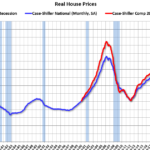An increase in the relative price of housing (compared to the prices of other goods and services) is the result of an increase in supply being less than an increase in demand. Many economic factors are at play, including population growth, land prices, and construction costs. Many political mandates and prohibitions play a role in limiting the supply of new housing units. Zoning regulations are a major factor. Canadian import tariffs on lumber impose an extra tax on residential construction. Over the past two years, the Fed has been raising interest rates (and indirectly, mortgage rates) to curb the inflation created by the money it has printed to support increased government spending.
Other interventions have the opposite effect. The federal government’s role in the supply of mortgage loans can lower mortgage prices. On the demand side, the deductibility of mortgage interest from income taxes (as well as home purchase subsidies) increases housing demand and prices. The aggregate effect of numerous government interventions on a particular market is often unclear.
Inconsistencies in government policy are not uncommon, but a more fundamental question is overlooked: Why should the government take a position for or against some homeowners? Why should the government care about this issue (other than to question existing interventions)? Consider the simple case of an owner-occupied housing unit (a single-family home or condominium) and its rising prices.
If home prices are rising, new buyers have to pay more, but existing owners see an increase in their property value and make more profit from the sale. Heirs of deceased homeowners and homeowners who want to downsize their homes are at an advantage. The homeowner who sells for a higher price obviously understands that the extra money is worth more to him (her, of course) than the benefits of staying put. The price difference between the old and new home may widen if the homeowner upsizes, but this is not necessarily the case in a diversified market where home prices do not rise at the same rate. To repeat the question, why would a government discriminate between one group of citizens and another, like new homeowners vs. current homeowners, by prioritizing lower home prices?
Most or all government policies are based on, and only work by, arbitrarily choosing sides and discriminating among citizens. It is largely a political fairy tale that governments produce “public goods” that all citizens want, thereby benefiting everyone. When governments produce goods or services that can be called “public,” they are almost always intended for certain groups of citizens. And there is no guarantee that most citizens will be net beneficiaries from the sum of government interventions. Governments are essentially, or at least to a large extent, redistribution machines. The underlying justification for redistribution is the utilitarian fiction that favored citizens gain more than discriminated citizens lose, i.e., the former are helped more than the latter are harmed.
It is this danger that some citizens will be exploited to help others that led James Buchanan and the school of constitutional and political economy to emphasize the “generality” requirement of government intervention. Discriminatory taxes, unequal subsidies, and regulations aimed at distributing benefits and costs among groups (such as zoning, in fact) are unnecessary. The same observation led Anthony de Jasay to dismiss all moral arguments in favor of the state. Both approachesBuchanans and De Jasay— is seriously defensible. (Friedrich Hayek Another approachbut the outline is not very neat, so I will omit it here.
The political function of government intervention, which in some cases drives up house prices and in other cases drives them down, is presumably to appear to be actively catering to the demands of various electoral clients and special interest groups.
The beauty of the market is that, as long as certain general conditions of formal equality are met, voluntary exchange without fraud takes place naturally between two adults. Each person benefits according to his or her own ideas, or so they think. Trying to find out who benefits most from a free exchange, who gets more “utility”, is an act of foolishness; it is impossible to calculate, even conceptually. Forcing individuals to make choices different from what they would have done by using coercive means, such as special taxes, is arbitrary authoritarianism.
We repeat the admonition given to the government by the Marquis d’Argenson, a friend of Voltaire and former minister to Louis XV: In his memoirs:Laissez-faire, morbre! Laissez-faire!” (Leave them alone, please! Leave them alone!).
*******************************************

The Home Goddess is coming to grab some stuff by DALL-E and your humble blogger







